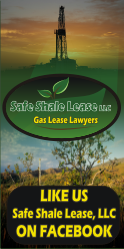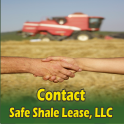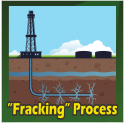Gas Well Leases: Lesson Learned Too Late
On Saturday, December 10, 2011
0
comments
After Scott Ely and his father talked with salesmen from an energy company about signing the lease allowing gas drilling on their land in northeastern Pennsylvania, he said he felt certain it required the company to leave the property as good as new.
So Mr. Ely said he was surprised several years later when the drilling company, Cabot Oil and Gas, informed them that rather than draining and hauling away the toxic drilling sludge stored in large waste ponds on the property, it would leave the waste, cover it with dirt and seed the area with grass. He knew that waste pond liners can leak, seeping contaminated waste.
“I guess our terms should have been clearer” about requiring the company to remove the waste pits after drilling, said Mr. Ely, of Dimock, Pa., who sued Cabot after his drinking water from a separate property was contaminated. “We learned that the hard way.”
Americans have signed millions of leases allowing companies to drill for oil and natural gas on their land in recent years. But some of these landowners — often in rural areas, and eager for quick payouts — are finding out too late what is, and what is not, in the fine print.
Energy company officials say that standard leases include language that protects landowners. But a review of more than 111,000 leases, addenda and related documents by The New York Times suggests otherwise:
In Pennsylvania, Colorado and West Virginia, some landowners have had to spend hundreds of dollars a month to buy bottled water or maintain large tanks, known as water buffaloes, for drinking water in their front yards. They said they learned only after the fact that the leases did not require gas companies to pay for replacement drinking water if their wells were contaminated, and despite state regulations, not all costs were covered.
Thousands of landowners in Virginia, Pennsylvania and Texas have joined class action lawsuits claiming that they were paid less than they expected because gas companies deducted costs like hauling chemicals to the well site or transporting the gas to market.
Some industry officials say the criticism of their business practices is misguided. Asked about the waste pits on Mr. Ely’s land in Pennsylvania, for example, George Stark, a Cabot spokesman, said the company’s cleanup measures met or exceeded state requirements. And the door-to-door salesmen, commonly known as landmen, who pitch the leases on behalf of the drilling companies also dismiss similar complaints from landowners, and say they do not mislead anyone.
Read the entire article by the New York Times...
So Mr. Ely said he was surprised several years later when the drilling company, Cabot Oil and Gas, informed them that rather than draining and hauling away the toxic drilling sludge stored in large waste ponds on the property, it would leave the waste, cover it with dirt and seed the area with grass. He knew that waste pond liners can leak, seeping contaminated waste.
“I guess our terms should have been clearer” about requiring the company to remove the waste pits after drilling, said Mr. Ely, of Dimock, Pa., who sued Cabot after his drinking water from a separate property was contaminated. “We learned that the hard way.”
Americans have signed millions of leases allowing companies to drill for oil and natural gas on their land in recent years. But some of these landowners — often in rural areas, and eager for quick payouts — are finding out too late what is, and what is not, in the fine print.
Energy company officials say that standard leases include language that protects landowners. But a review of more than 111,000 leases, addenda and related documents by The New York Times suggests otherwise:
- Fewer than half the leases require companies to compensate landowners for water contamination after drilling begins. And only about half the documents have language that lawyers suggest should be included to require payment for damages to livestock or crops.
- Most leases grant gas companies broad rights to decide where they can cut down trees, store chemicals, build roads and drill. Companies are also permitted to operate generators and spotlights through the night near homes during drilling.
- In the leases, drilling companies rarely describe to landowners the potential environmental and other risks that federal laws require them to disclose in filings to investors.
- Most leases are for three or five years, but at least two-thirds of those reviewed by The Times allow extensions without additional approval from landowners. If landowners have second thoughts about drilling on their land or want to negotiate for more money, they may be out of luck.
In Pennsylvania, Colorado and West Virginia, some landowners have had to spend hundreds of dollars a month to buy bottled water or maintain large tanks, known as water buffaloes, for drinking water in their front yards. They said they learned only after the fact that the leases did not require gas companies to pay for replacement drinking water if their wells were contaminated, and despite state regulations, not all costs were covered.
Thousands of landowners in Virginia, Pennsylvania and Texas have joined class action lawsuits claiming that they were paid less than they expected because gas companies deducted costs like hauling chemicals to the well site or transporting the gas to market.
Some industry officials say the criticism of their business practices is misguided. Asked about the waste pits on Mr. Ely’s land in Pennsylvania, for example, George Stark, a Cabot spokesman, said the company’s cleanup measures met or exceeded state requirements. And the door-to-door salesmen, commonly known as landmen, who pitch the leases on behalf of the drilling companies also dismiss similar complaints from landowners, and say they do not mislead anyone.
Read the entire article by the New York Times...







